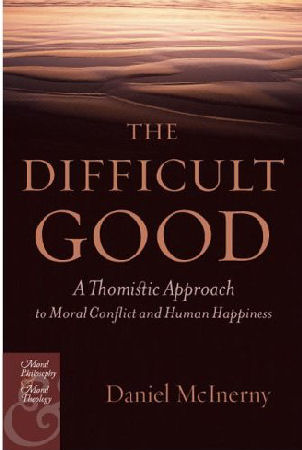
|
Posted October 11, 2006
Book: The Difficult Good: A Thomistic Approach to Moral Conflict and Human Happiness Author: Daniel McInerny Fordham University Press. New York. 2006. Pp. 212 An Excerpt from the Book:
An Excerpt from the Book: Within its depths I saw ingathered, bound by love in one volume, the scattered leaves of all the universe; substance and accidents and their relations, as though together fused, after such fashion that what I tell of is one simple flame. Dante, Paradiso, Canto 33 When in Canto 33 of the Paradiso Dante finally beholds the Love that moves the sun and the other stars, his quest for that which wholly satisfies human desire achieves its end. His disordered love for less-than-perfect goodness is now transformed into a love perfectly ordered to God, the summum bonum, as its highest object. Significantly, this transformation is achieved by Dante through a series of conflicts, a series that begins in the Dark Wood and continues through Hell and Purgatory — and presumably, after his privileged vision is over. Indeed, one way of understanding Dante’s quest is as a single conflict through which Dante grows in his appreciation of the right ordering of goods to one another, and to the absolutely highest good. The final resolution of the conflict constitutes his journey’s end: the harmonization of all competing strands of desire into one magnificent joy. Dante’s journey embodies a particular understanding of the human quest for happiness. Above all, his journey testifies to the possible success of that quest. Let human weakness and misfortune do their worst, still, the full transformation of our desire and the enjoyment of perfect happiness remain possible. Life is essentially cosmic. In Dante’s cosmic, a large part of what keeps this comic possibility open is the fundamental harmony or integrity of the human good, an integrity realized in a hierarchical ordering of goodnesses culminating in the ultimate goodness that is God. This hierarchical ordering of multiple goods allows for both the desirability of less-than-perfect goods, and the desirability of an ultimate good lacking in no perfection. It explains Dante’s love for many passing things, as well as how such loves direct him to the love of on eternal thing. Table of Contents: 1. Introduction: the difficult good 2. Incommensurability and tragic conflict 3. The business of order 4. Virtue and the twofold order 5. Practical reasoning and final ends 6. Natural hierarchy and moral obligation 7. Conflict 8. The virtues of conflict |
|
